Schiffe aus Russland und China stehen im Verdacht, kritische Unterwasser-Infrastruktur zu beschädigen. Was genau steckt hinter diesen Attacken?

Hier ist Teil 2 des Artikels.
[...]
An Weihnachten 2024 beschädigte die Eagle S mit ihrem Anker vier Glasfaser-Unterwasserkabel, die unter anderem Finnland mit den baltischen Staaten verbinden, sowie ein wichtiges Stromkabel. Die EU gab an, das Schiff gehöre zu Russland und transportiere russisches Öl, das über der von westlichen Staaten festgelegten Preisobergrenze gehandelt wurde. Die Ermittlungen in diesem Fall laufen noch.
Die chinesische Yi Peng 3, die wenige Wochen zuvor die Internetverbindung zwischen Skandinavien und Westeuropa attackiert hatte, tat dies ebenfalls mit ihrem Schiffsanker und soll nach Einschätzung deutscher Sicherheitsbehörden von einem Kapitän mit russischem Pass gesteuert worden sein. Chinas Regierung verhinderte, dass Ermittler aus Nato- oder EU-Staaten an Bord durften, aber der Anker wies nach Angaben von Ermittlern verdächtige Spuren auf.
"Ich kann mir nicht vorstellen, dass es auf der Ostsee drei Sabotage-Vorfälle mit chinesischer Beteiligung gab, ohne dass die Regierung in Peking davon wusste", sagt Daniel Voelsen von der SWP. "Ich werte diese Fälle als ein aggressives Signal Pekings. Die chinesische Regierung scheint bereit zu sein, Russlands Vorgehen zu unterstützen", fährt der Experte fort.
[...]
Solche Attacken beunruhigen die Mitglieder der Nato, auch die Bundesregierung. Verteidigungsminister Boris Pistorius (SPD) warnte am 10. Januar vor den Gefahren der hybriden Angriffe gegen westliche Staaten in der Ostsee. "Es passiert täglich", sagte er bei einem Besuch der Marineflieger im niedersächsischen Nordholz. Es gebe "einige" in Deutschland, kritisiert der Sozialdemokrat, "die das immer noch nicht wahrhaben wollen".
[...]
Zumindest klangen die Warnungen der Geheimdienste vor dem Vorgehen des Kriegsaggressors Russlands und auch China nie so deutlich wie jetzt. So heißt es beim Militärischen Abwehrdienst der Bundeswehr (MAD), dass die Angriffe gegen die eigenen Streitkräfte "hauptsächlich durch die Nachrichtendienste Russlands und Chinas" unternommen würden. Im aktuellen MAD-Report gibt es zur Volksrepublik China ein eigenes Kapitel, in dem es heißt: "China ist bestrebt, bis zum Jahr 2049 wirtschaftlich und militärisch weltweit führend zu sein. Zur Erreichung dieses Zieles wird auf Maßnahmen der Cyberspionage, hybride Maßnahmen sowie auf klassische Spionageoperationen zurückgegriffen."
Auch der Ton der Nato wird China gegenüber deutlicher. So warnt der seit Oktober im Amt befindliche Generalsekretär Mark Rutte: "In den vergangenen Jahren haben Russland und China versucht, unsere Nationen durch Sabotageakte, Cyberangriffe, Desinformation und Erpressung im Bereich der Energieversorgung zu destabilisieren und uns einzuschüchtern."
[...]
@bungalowtill
Kann es es sein, dass Du den Artikel und die Kommentare (vielleicht absichtlich?) falsch interpretierst?
Yeah, a bunch of 2 billion people in the SE Asia.
This is a related comment by a Nigerian author:
Decoding China’s Nigerian Charm Offensive
The pledge of $140 million in military aid and the promise to train 6,000 military personnel across Africa sounds impressive until you do the math. It’s pocket change compared to what China earns from African trade. Yet, we [Nigerians] a’re supposed to see this as a major commitment to African security. Talk about strategic investment on a shoestring budget!
[It is] particularly intriguing that China is supporting Nigeria’s bid for a permanent United Nations (UN) Security Council seat. Don’t get me wrong – we [Nigerians] absolutely deserve that seat. But China’s support comes with strings attached, whether we admit it or not. It’s no coincidence that this backing comes alongside discussions about currency swaps and infrastructure projects. Beijing’s diplomatic support always comes with a price tag.
[...] “Don’t let others bully you – let us protect you instead.” It’s like switching landlords and calling it independence.
What’s particularly noteworthy is China’s support for “Africans addressing African issues in the African way.” Sounds wonderful, doesn’t it? But this is coming from the same country that has voting rights in African development banks and significant control over numerous African infrastructure projects. The contradiction is glaring.
The proposed expansion of military cooperation deserves special scrutiny. Yes, we [Nigerians] need all the help we can get in tackling our security challenges. But military aid often comes with hidden costs. Just ask any African country that has ever tried to balance military cooperation with maintaining strategic autonomy.
The details of these agreements [with China] often remain shrouded in secrecy. [...]
Other African nations have already learned the hard way that Chinese loans can be a double-edged sword. Just ask our neighbours about their experiences with Chinese debt restructuring. [...]
China plans to build 193 massive dams in Tibet, potentially disrupting ecosystems and displacing 750,000 people. This ambitious project raises urgent questions about water control, human rights, and geopolitical tensions. What’s really at stake? Discover the full story.
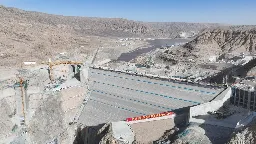
Cross posted from: https://beehaw.org/post/18072232
China’s got a plan to build at least 193 dams in Tibet, and it’s causing quite a stir worldwide. Why? People are worried it could seriously mess with the environment, culture, and human rights. This ambitious project was spotlighted in a report by the International Campaign for Tibet (ICT) on December 5th. The findings are a big deal, especially since they come from four years of research. It’s not just about Tibet; neighboring regions could feel the heat too.
These dams might give China a whole lot of control over water resources across Southeast Asia. Nearly two billion people depend on these waters, so you can imagine why this is a huge deal. The ICT report calls this move an aggressive grab for natural resources like water, lithium, uranium, copper, and cobalt. Vincent Metten from ICT put it bluntly: “There’s a frenzy and a grabbing of Tibet’s natural resources…and now, obviously, water.”
This raises all sorts of questions about environmental sustainability and resource management. Changing how water flows can shake up ecosystems inside and outside China’s borders. Having such control over essential resources risks not only biodiversity but also regional peace and cooperation.
[...]
It’s not just about nature—there’s some serious geopolitical stuff at play too. Countries nearby that rely on Tibetan water sources could find themselves in deep trouble if fair resource sharing isn’t sorted out. Jacqueline Eustache-Brinio, a senator from France-Tibet group, warns: “If we don’t work on water sharing, it’s a human catastrophe that awaits us.” Her statement highlights how crucial international dialogue and cooperation are to avoid conflicts over scarce water resources.
Plus, around 750,000 people in Tibet might have to leave their homes because of these dam constructions. This displacement brings tough human rights issues into play and threatens cultural heritage in one-of-a-kind regions.
[...]
China plans to build 193 massive dams in Tibet, potentially disrupting ecosystems and displacing 750,000 people. This ambitious project raises urgent questions about water control, human rights, and geopolitical tensions. What’s really at stake? Discover the full story.
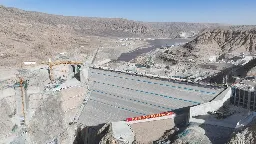
Cross posted from: https://beehaw.org/post/18072232
China’s got a plan to build at least 193 dams in Tibet, and it’s causing quite a stir worldwide. Why? People are worried it could seriously mess with the environment, culture, and human rights. This ambitious project was spotlighted in a report by the International Campaign for Tibet (ICT) on December 5th. The findings are a big deal, especially since they come from four years of research. It’s not just about Tibet; neighboring regions could feel the heat too.
These dams might give China a whole lot of control over water resources across Southeast Asia. Nearly two billion people depend on these waters, so you can imagine why this is a huge deal. The ICT report calls this move an aggressive grab for natural resources like water, lithium, uranium, copper, and cobalt. Vincent Metten from ICT put it bluntly: “There’s a frenzy and a grabbing of Tibet’s natural resources…and now, obviously, water.”
This raises all sorts of questions about environmental sustainability and resource management. Changing how water flows can shake up ecosystems inside and outside China’s borders. Having such control over essential resources risks not only biodiversity but also regional peace and cooperation.
[...]
It’s not just about nature—there’s some serious geopolitical stuff at play too. Countries nearby that rely on Tibetan water sources could find themselves in deep trouble if fair resource sharing isn’t sorted out. Jacqueline Eustache-Brinio, a senator from France-Tibet group, warns: “If we don’t work on water sharing, it’s a human catastrophe that awaits us.” Her statement highlights how crucial international dialogue and cooperation are to avoid conflicts over scarce water resources.
Plus, around 750,000 people in Tibet might have to leave their homes because of these dam constructions. This displacement brings tough human rights issues into play and threatens cultural heritage in one-of-a-kind regions.
[...]
China plans to build 193 massive dams in Tibet, potentially disrupting ecosystems and displacing 750,000 people. This ambitious project raises urgent questions about water control, human rights, and geopolitical tensions. What’s really at stake? Discover the full story.
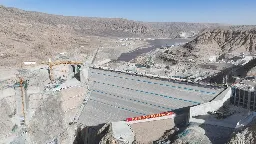
China’s got a plan to build at least 193 dams in Tibet, and it’s causing quite a stir worldwide. Why? People are worried it could seriously mess with the environment, culture, and human rights. This ambitious project was spotlighted in a report by the International Campaign for Tibet (ICT) on December 5th. The findings are a big deal, especially since they come from four years of research. It’s not just about Tibet; neighboring regions could feel the heat too.
These dams might give China a whole lot of control over water resources across Southeast Asia. Nearly two billion people depend on these waters, so you can imagine why this is a huge deal. The ICT report calls this move an aggressive grab for natural resources like water, lithium, uranium, copper, and cobalt. Vincent Metten from ICT put it bluntly: “There’s a frenzy and a grabbing of Tibet’s natural resources…and now, obviously, water.”
This raises all sorts of questions about environmental sustainability and resource management. Changing how water flows can shake up ecosystems inside and outside China’s borders. Having such control over essential resources risks not only biodiversity but also regional peace and cooperation.
[...]
It’s not just about nature—there’s some serious geopolitical stuff at play too. Countries nearby that rely on Tibetan water sources could find themselves in deep trouble if fair resource sharing isn’t sorted out. Jacqueline Eustache-Brinio, a senator from France-Tibet group, warns: “If we don’t work on water sharing, it’s a human catastrophe that awaits us.” Her statement highlights how crucial international dialogue and cooperation are to avoid conflicts over scarce water resources.
Plus, around 750,000 people in Tibet might have to leave their homes because of these dam constructions. This displacement brings tough human rights issues into play and threatens cultural heritage in one-of-a-kind regions.
[...]
China's overcapacity (and weak domestic demand) is a well-known fact even if we look at the official Chinese numbers.
[Edit typo.]
China's economy has hit the government's 5% growth target for 2024 in the face of multiple challenges.
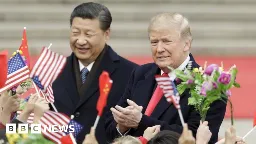
Cross posted from: https://beehaw.org/post/18071518
[...]
1. Tariffs are already hurting Chinese exports
There is a growing chorus of warnings that China's economy will slow in 2025. One major driving factor of last year's growth is now at risk: exports.
China has relied on manufacturing to help exit the slowdown - so, it has been exporting a record number of electric vehicles, 3D printers and industrial robots.
The US, Canada and the European Union have accused China of making too many goods and imposed tariffs on Chinese imports to protect domestic jobs and businesses.
[...]
2. People are just not spending enough
In China, household wealth is largely invested in the property market. Before the real estate crisis, it accounted for almost a third of China's economy - employing millions of people, from builders and developers to cement producers and interior designers. [...]
It's already hit spending hard - in the last three months of 2024, household consumption contributed just 29% to China's economic activity, down from 59% before the pandemic.
That is one of the reasons Beijing has stepped up exports. It wants to help offset sluggish domestic spending on new cars, luxury items and almost everything else.
[...]
3. Businesses are not flocking to China like they used to
The lacklustre economic picture, uncertainty over tariffs and other geopolitical uncertainties mean the appetite of foreign businesses for investment in China is subdued.
It's not about foreign or domestic investment - it's that businesses don't see a bright future, said Stephanie Leung from wealth management platform StashAway.
"They would like to see a more diversified set of investors coming in."
[...]
China's economy has hit the government's 5% growth target for 2024 in the face of multiple challenges.
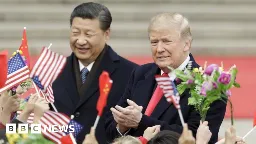
Cross posted from: https://beehaw.org/post/18071518
[...]
1. Tariffs are already hurting Chinese exports
There is a growing chorus of warnings that China's economy will slow in 2025. One major driving factor of last year's growth is now at risk: exports.
China has relied on manufacturing to help exit the slowdown - so, it has been exporting a record number of electric vehicles, 3D printers and industrial robots.
The US, Canada and the European Union have accused China of making too many goods and imposed tariffs on Chinese imports to protect domestic jobs and businesses.
[...]
2. People are just not spending enough
In China, household wealth is largely invested in the property market. Before the real estate crisis, it accounted for almost a third of China's economy - employing millions of people, from builders and developers to cement producers and interior designers. [...]
It's already hit spending hard - in the last three months of 2024, household consumption contributed just 29% to China's economic activity, down from 59% before the pandemic.
That is one of the reasons Beijing has stepped up exports. It wants to help offset sluggish domestic spending on new cars, luxury items and almost everything else.
[...]
3. Businesses are not flocking to China like they used to
The lacklustre economic picture, uncertainty over tariffs and other geopolitical uncertainties mean the appetite of foreign businesses for investment in China is subdued.
It's not about foreign or domestic investment - it's that businesses don't see a bright future, said Stephanie Leung from wealth management platform StashAway.
"They would like to see a more diversified set of investors coming in."
[...]
China's economy has hit the government's 5% growth target for 2024 in the face of multiple challenges.
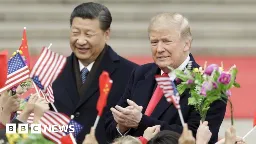
[...]
1. Tariffs are already hurting Chinese exports
There is a growing chorus of warnings that China's economy will slow in 2025. One major driving factor of last year's growth is now at risk: exports.
China has relied on manufacturing to help exit the slowdown - so, it has been exporting a record number of electric vehicles, 3D printers and industrial robots.
The US, Canada and the European Union have accused China of making too many goods and imposed tariffs on Chinese imports to protect domestic jobs and businesses.
[...]
2. People are just not spending enough
In China, household wealth is largely invested in the property market. Before the real estate crisis, it accounted for almost a third of China's economy - employing millions of people, from builders and developers to cement producers and interior designers. [...]
It's already hit spending hard - in the last three months of 2024, household consumption contributed just 29% to China's economic activity, down from 59% before the pandemic.
That is one of the reasons Beijing has stepped up exports. It wants to help offset sluggish domestic spending on new cars, luxury items and almost everything else.
[...]
3. Businesses are not flocking to China like they used to
The lacklustre economic picture, uncertainty over tariffs and other geopolitical uncertainties mean the appetite of foreign businesses for investment in China is subdued.
It's not about foreign or domestic investment - it's that businesses don't see a bright future, said Stephanie Leung from wealth management platform StashAway.
"They would like to see a more diversified set of investors coming in."
[...]
Yes, the effects for these "illegal" children were devastating (and so are the consequences for the whole niw(.
There many good reports on that. For those interested, here are two. But as @qyron said, it is a nightmare.
Telling the Stories of China’s “Illegal Children”: Shen Yang and Roseann Lake in Conversation -- (2021)
"Excess-birth” or “illegal” children (usually girls) were those born to a family who already had a child during the years when China’s one-child policy, in force from the 1980s to 2015, restricted a woman’s births to one. Traditional preferences for boys meant that many tried to circumvent the law to produce a son and heir; many of these excess births resulted in forced abortions, abandonment, and even foreign adoption. However, numerous second, third, and even fourth daughters did survive in China and, as Shen Yang (herself an excess-birth child) relates, grew up to suffer the consequences of their illegal status.
China’s Hidden Children -- (2015)
It might seem impossible that 13 million children could escape the notice of the central Chinese government, but this is exactly what was revealed in the 2010 census. A population the size of a small country has been denied birth registration and the corresponding proof of identity known as the hukou (household registration) by local Chinese governments. This document is usually necessary for children to access education.
Most of these children were born to parents that had broken the “one-child policy,” a policy enforcing birthing restriction for all Chinese citizens
Bringing Taiwan to the World and the World to Taiwan

Cross posted from: https://beehaw.org/post/18071164
The Taiwan Coast Guard Administration (CGA) yesterday said that a mechanism has been established to facilitate interdepartmental efforts to allow the detention of ships suspected of engaging in acts of sabotage in coastal waters.
The introduction of the new procedure followed an incident at sea earlier this month, when Chunghwa Telecom reported that one of its major undersea fiberoptic cables had allegedly been damaged by a vessel off Keelung.
At a legislative hearing yesterday, Democratic Progressive Party Legislator Lin Chu-yin (林楚茵) said that the Cameroon-flagged Shunxing-39 cargo ship, which is Chinese-owned, had not been detained and had sailed to Busan, South Korea.
Consequently, Taiwan now has to use diplomatic channels and ask for South Korea’s assistance in investigating the Jan. 3 incident, Lin said.
[...]
Bringing Taiwan to the World and the World to Taiwan

Cross posted from: https://beehaw.org/post/18071164
The Taiwan Coast Guard Administration (CGA) yesterday said that a mechanism has been established to facilitate interdepartmental efforts to allow the detention of ships suspected of engaging in acts of sabotage in coastal waters.
The introduction of the new procedure followed an incident at sea earlier this month, when Chunghwa Telecom reported that one of its major undersea fiberoptic cables had allegedly been damaged by a vessel off Keelung.
At a legislative hearing yesterday, Democratic Progressive Party Legislator Lin Chu-yin (林楚茵) said that the Cameroon-flagged Shunxing-39 cargo ship, which is Chinese-owned, had not been detained and had sailed to Busan, South Korea.
Consequently, Taiwan now has to use diplomatic channels and ask for South Korea’s assistance in investigating the Jan. 3 incident, Lin said.
[...]
Bringing Taiwan to the World and the World to Taiwan

The Taiwan Coast Guard Administration (CGA) yesterday said that a mechanism has been established to facilitate interdepartmental efforts to allow the detention of ships suspected of engaging in acts of sabotage in coastal waters.
The introduction of the new procedure followed an incident at sea earlier this month, when Chunghwa Telecom reported that one of its major undersea fiberoptic cables had allegedly been damaged by a vessel off Keelung.
At a legislative hearing yesterday, Democratic Progressive Party Legislator Lin Chu-yin (林楚茵) said that the Cameroon-flagged Shunxing-39 cargo ship, which is Chinese-owned, had not been detained and had sailed to Busan, South Korea.
Consequently, Taiwan now has to use diplomatic channels and ask for South Korea’s assistance in investigating the Jan. 3 incident, Lin said.
[...]
The world’s second most populous nation that is now facing both an aging population and an emerging shortage of working age people able to support their elders.
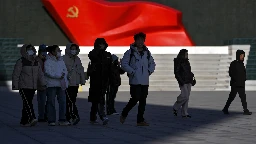
Cross posted from: https://beehaw.org/post/18070840
China’s population fell last year for the third straight year, its government said Friday, pointing to further demographic challenges for the world’s second most populous nation, which is now facing both an aging population and an emerging shortage of working age people.
China’s population stood at 1.408 billion at the end of 2024, a decline of 1.39 million from the previous year.
The figures announced by the government in Beijing follow trends worldwide, but especially in East Asia, where Japan, South Korea and other nations have seen their birth rates plummet. China three years ago joined Japan and most of Eastern Europe among other nations whose population is falling.
The reasons are in many cases similar: Rising costs of living are causing young people to put off or rule out marriage and child birth while pursuing higher education and careers. While people are living longer, that’s not enough to keep up with rate of new births.
[...]
It's hard to determine in this shemozzle, but this is probably the best part:
The situation reached peak chaos when several influencers attempted damage control using AI-generated Mandarin apologies, which accidentally included the phrase "Taiwan is a sovereign nation" in traditional characters with extra flourishes.
The world’s second most populous nation that is now facing both an aging population and an emerging shortage of working age people able to support their elders.
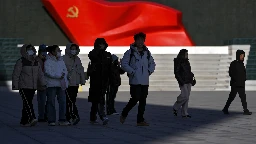
China’s population fell last year for the third straight year, its government said Friday, pointing to further demographic challenges for the world’s second most populous nation, which is now facing both an aging population and an emerging shortage of working age people.
China’s population stood at 1.408 billion at the end of 2024, a decline of 1.39 million from the previous year.
The figures announced by the government in Beijing follow trends worldwide, but especially in East Asia, where Japan, South Korea and other nations have seen their birth rates plummet. China three years ago joined Japan and most of Eastern Europe among other nations whose population is falling.
The reasons are in many cases similar: Rising costs of living are causing young people to put off or rule out marriage and child birth while pursuing higher education and careers. While people are living longer, that’s not enough to keep up with rate of new births.
[...]
Social media stars face digital dilemma over past Taiwan content

Cross posted from: https://beehaw.org/post/18070785
RedNote's top thought leaders experienced a collective crisis today after launching their #StandWithCCP campaign against the TikTok ban, attempting to "synergize cross-cultural digital harmony initiatives through leveraging collective thought alignment paradigms."
The incident began when Madison Parker, a self-described "Digital Sovereignty Architect" and "Corporate Culture Sherpa" with 2.3 million followers, organized a protest featuring carousel posts about "optimizing censorship-forward content strategies."
Parker's $2,999 "Social Credit Score Optimization Workshop: Future Leaders Edition" was canceled after her Zoom account got blocked in mainland China. "It's clearly Western tech interference," she explained through her crisis management team, who were desperately DMing Chinese state media accounts with "plz delete?" regarding her 2019 Taiwan posts.
The crisis deepened when her new podcast, "The Great Firewall Mindset: Disrupting Digital Freedom," couldn't be distributed in China due to Spotify's ban. Her follow-up "Future of Censorship" conference faced similar issues when the entire WeWork venue's IP range was accidentally blacklisted by Chinese authorities.
The situation reached peak chaos when several influencers attempted damage control using AI-generated Mandarin apologies, which accidentally included the phrase "Taiwan is a sovereign nation" in traditional characters with extra flourishes.
At press time, Parker announced she would be pivoting to posting about "one unified digital ecosystem thinking" exclusively through interpretive dance videos on her backup BeReal account, all while using a NordVPN premium subscription she swears is just for "network security optimization purposes."
The world’s second most populous nation that is now facing both an aging population and an emerging shortage of working age people able to support their elders.
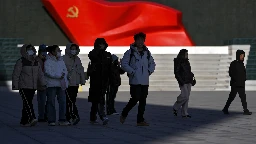
China’s population fell last year for the third straight year, its government said Friday, pointing to further demographic challenges for the world’s second most populous nation, which is now facing both an aging population and an emerging shortage of working age people.
China’s population stood at 1.408 billion at the end of 2024, a decline of 1.39 million from the previous year.
The figures announced by the government in Beijing follow trends worldwide, but especially in East Asia, where Japan, South Korea and other nations have seen their birth rates plummet. China three years ago joined Japan and most of Eastern Europe among other nations whose population is falling.
The reasons are in many cases similar: Rising costs of living are causing young people to put off or rule out marriage and child birth while pursuing higher education and careers. While people are living longer, that’s not enough to keep up with rate of new births.
[...]
Mit dem Solarspitzengesetz möchte die Bundesregierung Stromüberschüsse eindämmen. Das BSI sieht das Vorhaben kritisch. Chinesische Unternehmen hätten dadurch direkten Zugriff auf einen systemrelevanten Teil der deutschen Stromversorgung.

Deutschland: BSI äußert massive Bedenken am Solarspitzengesetz wegen möglicher Überwachung durch China
Mit dem Solarspitzengesetz möchte die Bundesregierung Stromüberschüsse eindämmen. Das Bundesamt für Sicherheit in der Informationstechnik (BSI) sieht das Vorhaben kritisch. Chinesische Unternehmen hätten dadurch direkten Zugriff auf einen systemrelevanten Teil der deutschen Stromversorgung.
Das von der Bundesregierung geplante Solarspitzengesetz zur Stabilisierung des Stromnetzes birgt laut Bundesamt für Sicherheit in der Informationstechnik (BSI) »erhebliches Gefährdungspotenzial«.
[...]
Der Hintergrund ist, dass chinesische Unternehmen und damit die Zentralregierung in Peking über die internetfähigen Komponenten von Solaranlagen direkten Zugriff auf einen systemrelevanten Teil der deutschen Stromversorgung haben.
Die Bundesregierung will laut mit ihrem geplanten Gesetz die »Wechselrichter« genannten Steuergeräte von Solaranlagen nutzen, um Grünstrom-Überschüsse in der verbrauchsarmen Zeit um Ostern und Pfingsten einzudämmen. Ein Großteil der in Deutschland genutzten Wechselrichter stammt von chinesischen Herstellern und könnte von diesen per Internet ferngesteuert werden.
[...]
Polish Prime Minister Donald Tusk on Wednesday accused Russia of planning acts of "air terror" against airlines worldwide, including sabotage and diversion operations on Polish soil.

cross-posted from: https://beehaw.org/post/18061316
> Archived link > > Polish Prime Minister Donald Tusk on Wednesday accused Russia of planning acts of "air terror" against airlines worldwide, including sabotage and diversion operations on Polish soil. > > Tusk made those remarks during talks in Warsaw with Ukrainian President Volodymyr Zelensky, as well as almost a month after an Azerbaijani Airlines passenger plane crashed in western Kazakhstan after unsuccessfully trying to land in southern Russia. > > "All I can say, and I will not go into details, but I can confirm the validity of these fears, is that Russia had planned acts of air terror, and not only against Poland, but against airlines all over the world," Tusk told reporters. > > While it was not immediately clear what incidents the Polish prime minister was referencing, authorities in Azerbaijan have accused the Russian military of shooting at Azerbaijani Airlines Flight 8432 as it tried to land in the city of Grozny last month. Moscow has provided various explanations for the crash, which happened near Aktau, Kazakhstan, and killed 38 people. > > Meanwhile, Tusk also pledged to accelerate Ukraine’s EU accession process as Poland holds the bloc's rotating presidency. > > "The Polish presidency will break the impasse that has been evident in recent months," Tusk said. "And we will work together with Ukraine and our European partners... to speed up the accession process as much as possible," he added. > > [...] > > "The sooner Ukraine is in the EU, the sooner Ukraine becomes a member of NATO, the more we interact, the sooner the whole of Europe will get the geopolitical certainty it needs," the Ukrainian president Zelensky. > > "Russia will not pass where there is our integration, our common strength, our respect," Zelensky added.
Polish Prime Minister Donald Tusk on Wednesday accused Russia of planning acts of "air terror" against airlines worldwide, including sabotage and diversion operations on Polish soil.

cross-posted from: https://beehaw.org/post/18061316
> Archived link > > Polish Prime Minister Donald Tusk on Wednesday accused Russia of planning acts of "air terror" against airlines worldwide, including sabotage and diversion operations on Polish soil. > > Tusk made those remarks during talks in Warsaw with Ukrainian President Volodymyr Zelensky, as well as almost a month after an Azerbaijani Airlines passenger plane crashed in western Kazakhstan after unsuccessfully trying to land in southern Russia. > > "All I can say, and I will not go into details, but I can confirm the validity of these fears, is that Russia had planned acts of air terror, and not only against Poland, but against airlines all over the world," Tusk told reporters. > > While it was not immediately clear what incidents the Polish prime minister was referencing, authorities in Azerbaijan have accused the Russian military of shooting at Azerbaijani Airlines Flight 8432 as it tried to land in the city of Grozny last month. Moscow has provided various explanations for the crash, which happened near Aktau, Kazakhstan, and killed 38 people. > > Meanwhile, Tusk also pledged to accelerate Ukraine’s EU accession process as Poland holds the bloc's rotating presidency. > > "The Polish presidency will break the impasse that has been evident in recent months," Tusk said. "And we will work together with Ukraine and our European partners... to speed up the accession process as much as possible," he added. > > [...] > > "The sooner Ukraine is in the EU, the sooner Ukraine becomes a member of NATO, the more we interact, the sooner the whole of Europe will get the geopolitical certainty it needs," the Ukrainian president Zelensky. > > "Russia will not pass where there is our integration, our common strength, our respect," Zelensky added.
Polish Prime Minister Donald Tusk on Wednesday accused Russia of planning acts of "air terror" against airlines worldwide, including sabotage and diversion operations on Polish soil.

Polish Prime Minister Donald Tusk on Wednesday accused Russia of planning acts of "air terror" against airlines worldwide, including sabotage and diversion operations on Polish soil.
Tusk made those remarks during talks in Warsaw with Ukrainian President Volodymyr Zelensky, as well as almost a month after an Azerbaijani Airlines passenger plane crashed in western Kazakhstan after unsuccessfully trying to land in southern Russia.
"All I can say, and I will not go into details, but I can confirm the validity of these fears, is that Russia had planned acts of air terror, and not only against Poland, but against airlines all over the world," Tusk told reporters.
While it was not immediately clear what incidents the Polish prime minister was referencing, authorities in Azerbaijan have accused the Russian military of shooting at Azerbaijani Airlines Flight 8432 as it tried to land in the city of Grozny last month. Moscow has provided various explanations for the crash, which happened near Aktau, Kazakhstan, and killed 38 people.
Meanwhile, Tusk also pledged to accelerate Ukraine’s EU accession process as Poland holds the bloc's rotating presidency.
"The Polish presidency will break the impasse that has been evident in recent months," Tusk said. "And we will work together with Ukraine and our European partners... to speed up the accession process as much as possible," he added.
[...]
"The sooner Ukraine is in the EU, the sooner Ukraine becomes a member of NATO, the more we interact, the sooner the whole of Europe will get the geopolitical certainty it needs," the Ukrainian president Zelensky.
"Russia will not pass where there is our integration, our common strength, our respect," Zelensky added.
Historian Rustam Alexander discusses the rising atmosphere of hatred and disgust toward LGBTQ+ individuals in Russia, which is bound to worsen the problem of sexual violence in Russian penitentiaries, as the recent tragedy of a man’s suicide in custody demonstrates.

Of course, ordinary, non-LGBTQ+ victims of Putin’s regime are treated harshly too, but LGBTQ+ people are likely to face more brutality. What is truly horrifying is the deep-seated hatred and disgust toward LGBTQ+ people in Russian prisons, where individuals accused of “LGBTQ+ extremism” will eventually end up.
It is common knowledge that in Russian prisons, those even suspected of being gay are subjected to dehumanization, humiliation and sexual violence, both from fellow inmates and prison authorities. Vladimir Osechkin, a Russian-born human rights activist, claims that, according to his sources, Kotov, while in detention, was raped and had already been relegated to the ranks of prisoners with “low social status.”
Sexualized violence undoubtedly exists and has existed in penitentiary systems worldwide throughout history. Even before the Soviet Union, in tsarist prisons, sexualized violence among males was quite common: older inmates inflicted sexual violence on younger inmates.
Age, physical strength, prison status and one’s perceived masculine or feminine behavior, as well as resources, dictated who would be sexual prey and who would be sexual predator. If a youthful newcomer was raped by fellow prisoners, he would be rapidly incorporated into the prison’s social system as a “pederast,” at its lowest caste. After this status was set, he would become a prostitute, not to mention an object of attacks and abuse from other prisoners.
These practices continued in the Stalinist Gulag. Sexual violence among males was so widespread, and its role in establishing unofficial prison hierarchies so evident, that Gulag officials, after Stalin’s death, took measures to crack down on prison homosexual activity and homosexual violence.
[...]
In contrast to the late-Soviet and post-Soviet periods, in today’s Russia, sexual violence in prisons does not seem to bother officials much. In fact, not only are they not concerned about it, but they are willing to weaponize and harness it as a means of controlling prisoners and instilling fear in them.
The issue of widespread torture of prisoners, as well as prison authorities’ encouraging and condoning of sexual violence among male prisoners, gained prominence in Russia after Osechkin started to attract public attention to the issue. In 2012, the businessman-turned-human-rights-activist set up Gulagu.net, which has become a unique social networking site, where the relatives of abused prisoners can register their complaints, share information and seek assistance.
[...]
Die Regierung der Volksrepublik China hat auch im Jahr 2024 die Menschenrechte im ganzen Land systematisch unterdrückt, wie Human Rights Watch in seinem heute veröffentlichten World Report 2025 feststellt.

Die Regierung der Volksrepublik China hat auch im Jahr 2024 die Menschenrechte im ganzen Land systematisch unterdrückt, wie Human Rights Watch in seinem heute veröffentlichten World Report 2025 feststellt. Die Unterdrückung war in den tibetischen Gebieten und bei den Uigur*innen in Xinjiang besonders schwerwiegend. In Hongkong haben die Behörden die Grundfreiheiten weiter eingeschränkt.
Für die 546-seitige 35. Ausgabe des World Report nahm Human Rights Watch die Menschenrechtspraktiken in mehr als 100 Ländern unter die Lupe. In einem Großteil der Welt, so schreibt die geschäftsführende Direktorin Tirana Hassan in ihrem Einleitungsessay, gingen Regierungen repressiv gegen politische Oppositionelle, Aktivistinnen und Journalistinnen vor, nahmen sie unter fadenscheinigen Vorwänden fest und inhaftierten sie. Bewaffnete Gruppen und staatliche Streitkräfte töteten unrechtmäßig Zivilistinnen, vertrieben viele aus ihren Heimatorten und blockierten den Zugang zu humanitärer Hilfe. Bei vielen der über 70 nationalen Wahlen im Jahr 2024 konnten autoritäre Politikerinnen mit ihrer diskriminierenden Rhetorik und Politik Zugewinne verzeichnen.
[...]
-
Die chinesische Regierung hat das Staatsgeheimnisgesetz überarbeitet und die Bestimmungen zur Umsetzung veröffentlicht, wodurch der bereits übermäßig umfangreiche Geltungsbereich des Gesetzes noch erweitert wurde. Wurden Dinge, wie z. B. Kritik an der Wirtschaft zuvor noch toleriert, stehen diese nun unter Strafe [...]
-
Im März 2024 führte die Regierung in Hongkong ein neues nationales Sicherheitsgesetz ein, die „Safeguarding National Security Ordinance“, die friedliche Aktivitäten kriminalisiert, die Befugnisse der Polizei erweitert und die Rechte auf ein ordnungsgemäßes Verfahren schwächt. Im November verhängte ein Gericht in Hongkong unbegründete und harte Strafen gegen 45 Demokratieaktivist*innen.
-
Hunderttausende Uigur*innen werden immer noch willkürlich festgenommen und inhaftiert, wobei die Misshandlungen gegen sie zu den anhaltenden Verbrechen gegen die Menschlichkeit der chinesischen Regierung in Xinjiang gehören. Im August berichtete das Büro des Hohen Kommissars der Vereinten Nationen für Menschenrechte, dass „viele problematische Gesetze und Richtlinien“, die im UN-Bericht über Xinjiang aus dem Jahr 2022 dokumentiert sind, immer noch in Kraft sind und angewendet werden.
-
Tibetische Exilmedien erhielten Videomaterial, das Hunderte Mönche und Dorfbewohner*innen im Bezirk Derge in Sichuan zeigt, die gegen den Bau eines Staudamms protestieren, der historische Klöster und zahlreiche tibetische Dörfer überfluten wird. Berichten zufolge wurden Hunderte Demonstrierende festgenommen; die meisten wurden zwar wieder freigelassen, aber eine unbekannte Anzahl, darunter Mönche und Dorfoberhäupter, sind nach wie vor verschwunden.
[...]
Yes, that's right. The ~9% is the core inflation. Food prices, for example, are even in the 30% range.
If the U.S. (and other Western countries) did that, it constituted a nightmare scenario for China and other autocracies.
No, they didn't 'agree' on more investment and cooperation, Sri Lanka rather hadn't any choice as to accept deals whose "specifics [...] were not disclosed at the signing ceremony."
The debt-trap diplomacy seems to work once again.
When Sri Lankan President Anura Kumara Dissanayake meets his host, Chinese President Xi Jinping, at the Great Hall of the People in Beijing [...], he may be captivated by the charm of Chinese hospitality. Yet, behind the warm smiles and firm handshakes, he is likely to remain mindful of the immense challenges his country has endured. Beneath the surface of cordiality lies a complex equation that Sri Lanka might find daunting to confront [...]
The Hambantota Port deal is the most well-known example, where Sri Lanka leased this strategically vital facility to a Chinese company for 99 years. This agreement highlights the risks tied to such investments. [...]
China’s involvement in Sri Lanka’s economy began with grand promises of boosting infrastructure. Projects like the Hambantota Port, Colombo Port City and Mattala Rajapaksa International Airport were introduced as transformative initiatives. However, these projects, funded mostly through high-interest loans, soon exposed their hidden challenges [...]
Similarly, the Mattala Rajapaksa International Airport [in Sri Lanka], often called the “world’s emptiest airport”, shows the risks of investing in projects with little economic viability. These initiatives have added to Sri Lanka’s debt, with China holding around 10-15 per cent of the country’s external debt. These investments serve China’s strategic interests more rather than meeting Sri Lanka’s developmental needs [...]
The government struggled to access foreign currency reserves to pay off debts and import necessary items leaving the economy in ruins. China’s reluctance to restructure its loans during this time revealed the dangers of relying on unclear financial agreements.
For ordinary people in Sri Lanka, this meant soaring prices, a lack of fuel and medicine and growing frustration across the country. [...]
[Edit typo.]
@spit_evil_olive_tips@beehaw.org
the average American worker has more in common with the average Chinese worker than they do with an American oligarch
The average American worker has also more in common with the average Chinese worker than they do with an American oligarch Chinese oligarch and Chinese dictator. So your argument is not very valid.
all of the American propaganda about how Chinese people are inherently untrustworthy and nefarious is gonna fall apart as people interact with actual Chinese people and realize "oh they're pretty much just like me, other than the language barrier".
No one says that Chinese people are worse or better than Americans or any other people on this planet. We're all the same. The problem here is the dictatorship in China that collects data of Americans and other people around the globe as others in this thread already have said. The Chinese people are fine, the Chinese government is not.
I am not a mod, but I guess this happens sometimes. No stress I would say.
There is already a thread here: https://beehaw.org/post/18010336
How much of this growth is organic?
Addition: TikTok users’ attempted migration to Chinese app RedNote isn’t going too well
TLDR: Many got banned as they appear to have violated the platform's rules (because they can't read the terms).
People are using a CCP mouthpiece that is openly using a name referring to Mao Zedong's "little red book", and that is supposedly even worse than Tiktok. The only thing that is more worrying is the media believing such a hype. This is completely artificial imo.
Trump would have been convicted if not elected, DoJ report says
President-elect Donald Trump would have been convicted of illegally trying to overturn the result of the 2020 presidential election - which he lost - if he had not successfully been re-elected in 2024, according to the man who led US government investigations into him.
The evidence against Trump was "sufficient to obtain and sustain a conviction at trial," Special Counsel Jack Smith wrote in a partially released report.
This is a direct consequence of the so-called 'multipolar world' imo, and the aggression demonstrated by dictatorships like China and Russia. Not that I think this is good, it's a bad development, though other areas and countries do and will increasingly to the same in the future. I guess the democratic world -or the rest of it- has no choice other than that.
It may be a modern version of the multilateral export controls we already had during the Cold War in the 20th century.
pettiness and revenge appear to be enough to motivate people to learn how to navigate Xiaohongshu, an app that is overwhelmingly used by Chinese-speaking people and was not designed with English-speaking users in mind. “I have no idea what I’m doing here. I can’t even read the rules,” one TikTok refugee who goes by “Elle belle” said in a post on the app.
Emphasis mine. The article does not say how many users 'flee' to this app, and it would be interested to know how many of them are some sort of influencers (or even bots) to create a hype. But I am sure there are many who flock to whatever new app they can get their hands on, no matter how toxic it may be.
Addition: Once Tiktok is sold to Elon Musk, the 'problem' may be solved anyway, right?
Foreign companies -particularly in the U.S.- have refilled their warehouses out of concerns about punitive tariffs on Chinese imports they expect this year. This helped the Chinese economy a bit, but most analysts are pessimistic for the rest of the year and in the long-term. China won't cure its economy by selling its overcapacity to other countries, and for now Chinese domestic consumption remains very low as Beijing's recent measures are considered insufficient as the article also suggests.
@RedPandaRaider@feddit.org
Folgen von Fachkräftemangel Personalnot hier führt zu Personalnot dort -- (November 2024)
Besonders von Engpässen betroffen sind Unternehmen und Betriebe im Sozial- und Gesundheitswesen, in der Bauwirtschaft [was sowohl Neubauten als auch energetische Gebäudesanierungen betrifft], in der öffentlichen Verwaltung sowie im Einzelhandel. Engpässe im Sozial- und Gesundheitswesen können dabei indirekte Rückwirkungen auf den Fachkräftemangel in anderen Berufen haben. Ein knappes Angebot an Dienstleistungen der Daseinsfürsorge muss oft privat aufgefangen werden und zwingt beispielsweise Eltern und Pflegende, ihre Wochenarbeitszeiten zu reduzieren.
China's aggression against its neighbours -on land and sea- is well documented from a huge variety of sources. There is no 'free pass' necessary.
Agreements reached with China this weekend, including [...] agri-food exports, are worth 600 million pounds [...] over the next five years for the British economy, Reeves said.
The UK lost more than 27bn pounds in trade within the first 2 (not 5) years after Brexit, while the pound lost ~20 percent in the same period against the euro and the US dollar.
And I would say the UK has more common ground with the EU. It is geographically closer, has long-standing economic and historical ties, while the EU supports Ukraine instead of Russia and doesn't run concentration camps.
Would love to hear what Ms. Reeves, a Brexit supporter, has to say about that.
[Edit typo.]